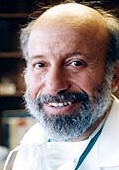 Dr. Sherman Silber
Dr. Sherman Silber
The procedure is still quite experimental. BBC News reported Nov. 12, 2008 on the world's first whole ovary transplant. It resulted in a healthy baby girl born in London to a 39-year-old German-born woman married to a Briton.
Her ovaries stopped working when she was 15, but she got a donor ovary from her identical twin sister in early 2007 and became pregnant a year later.
(A transplanted ovary from a woman who is not an identical twin would produce genetically different eggs.)
The transplant was carried out by Dr. Sherman Silber at the Infertility Center of St. Louis, St. Louis MO. He said women could have an ovary frozen in their 20s, then have it implanted in their 30s or 40s. "A young ovary can be transplanted back at any time and it will extend fertility and delay the menopause. You could even wait until you were 47." (For most women, it would be simpler to have IVF with donor eggs.)
An option before cancer treatment
The technique of removing and freezing an ovary could also be used by women facing radiotherapy and chemotherapy treatment.
Dr. Silber's team has successfully frozen 27 ovaries and five fallopian tubes for future transplant. A fallopian tube transplant would benefit women with irreparable tubal disease.
Speaking for the British Fertility Society, surgeon Laurence Shaw said most younger women whose ovaries fail would have little or no warning of this in time to store their own ovary, and no identical twin to supply a replacement. "In terms of delaying motherhood, there are other techniques, such as egg freezing, which are likely to be more appropriate."
Other women have given birth after receiving a slice of ovary tissue grafted onto their own ovary. The first graft transplant to produce a successful pregnancy, in 2004, was also between twin sisters.
Background
Sept. 24, 2004. First baby born after ovarian transplant. By Shaoni Bhattacharya, New Scientist. A woman made infertile by cancer treatment has given birth to a healthy baby after transplantation of her own ovarian tissue. Ouarda Touirat gave birth in Brussels, Belgium. Seven years earlier she had some of her ovarian tissue frozen before undergoing chemotherapy for Hodgkin's lymphoma.
Aug. 2, 2007. Ovary transplant produces embryo in sister. By Roxanne Khamsi, New Scientist. Teresa Alvaro produced an embryo after receiving an ovarian graft from her sister, not her identical twin. However the embryo did not survive. In 1990 she had undergone chemotherapy and radiation therapy, which destroyed the eggs in her ovaries.
Nov. 12, 2008. Baby born after ovary transplant. BBC News. The 39-year-old mother didn't intend to become pregnant, but hoped that the transplanted ovary from her identical twin could relieve symptoms of her early menopause and restore her periods. The ovary was implanted with minimal risk of rejection by her body, using microsurgery to reattach it to its blood supply and hold it in place alongside the fallopian tube, so that eggs could be expelled and travel down the tube towards the womb in the normal way.
You may reproduce this item with the credit:
"From Family Helper, www.familyhelper.net"




